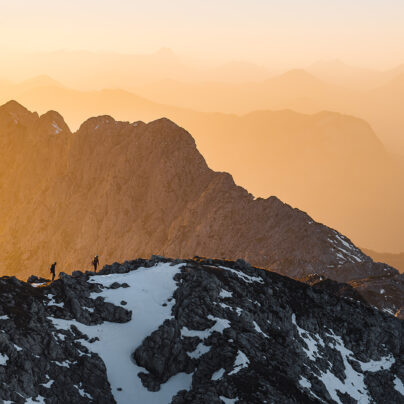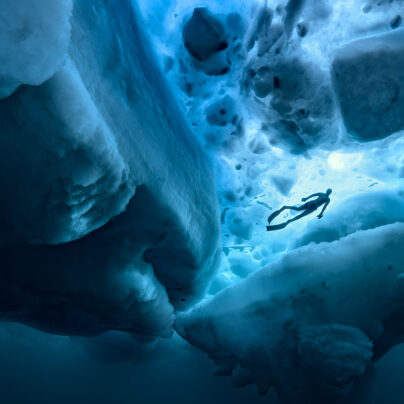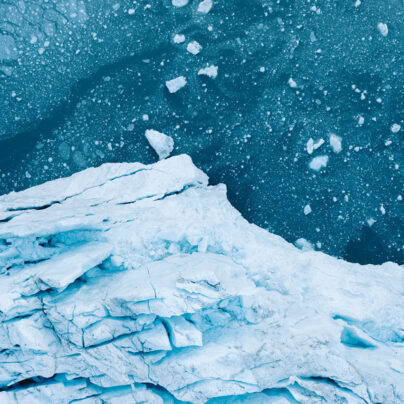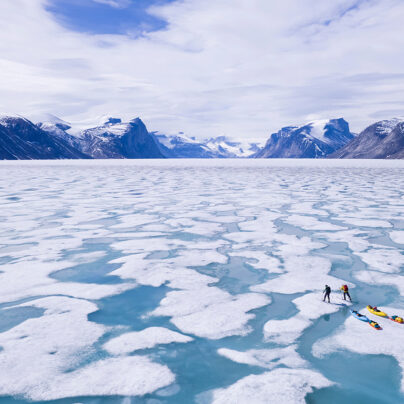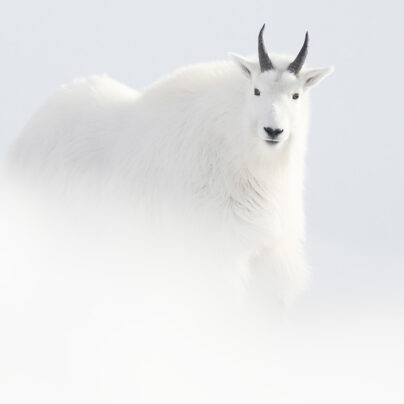Razed In The Wild
Josh Barringer // Photography by Julian Kenchenten
‘I don’t think you boys are going to make it in time,’ George, our boat’s captain, said as he looked down at his tide charts. ‘If the tide catches you at Cape Sutil, you’ll be stuck for the night.’ Julian glanced at me, tension woven into his expression. I stared at my own tide chart and route details, still secure in their flimsy Ziploc bag. Were my calculations accurate? Could we hit our pace? And was that tempo sustainable through rugged terrain and unforeseen circumstances? Had I built in enough room for contingencies? My mind fell into fog as the boat pitched and yawed beside evergreen-lined coastal cliffs. I tried to trust my preparation and focus on the task ahead. Evidence of habitation thinned and faded. Seen from above, we were a tiny grain on a wide beach; one mistake, one error of judgement, and we’d be washed away.
Running in remote wilderness is concentrated adventure, vivid and overwhelming for the senses. Exploring the wild through running offers a key to places where a race would never be held. But here a runner has to be completely self-sufficient. There’s no event support, no uplifting cheers or finish-line fanfare, just the soul-rending knowledge that you’re swimming in the deep, cold waters of vulnerability. I crave that balance of skill and will required for self-reliant pursuits that evoke passions lost in the comfort of modernity. Contemporary pretences weaken and fade when survival is paramount. Some truths are touched off only in that space between risk and exhaustion.
George and his wife operate the sole water-taxi service for access to Shushartie Bay, the eastern start of the North Coast Trail. No-one had been on the trail so far that spring and George was reluctant to take us without a firm report of the conditions. Two critical river crossings rely on cable cars whose condition was as yet unconfirmed. Before our arrival, a savage storm with 90km winds had swept through; another cell was on the way. At this time of year, no other people would be on the trail and the limitations of George’s vessel meant that if anything were to go wrong, we were at least 12 hours from help arriving. And that was if weather permitted help to reach us. Running in such isolation, over challenging terrain, was highly risky.
The boat growled as it idled. A heightened sense of awareness fell over me, throwing every detail into stark relief: the baying wind catching the rampant spray of the waves, the trails of green kelp painting the Shushartie shore. I hesitated before jumping from the bow onto slick, unstable rock. A sprained ankle would be an unwanted start to our wild run, but we layered down and made our way. Stillness followed, the settling of an eerie calm. We were completely alone. We took in deep breaths and gave each other high-fives. Show time. Dramatic and technical terrain lay ahead and the clock ticked. The clamour of the waves faded to a whisper, leaving us with just our footsteps and the smell of moss and silt.
Through gnarled roots and thick mire, each step fell with solid intention. Every risk, every chance taken, every mistake made here has magnified consequences. The faster we moved, the higher the price of risk we paid.



The steep, rocky cliffs forced the path into the surf. Then, over sheer, rooted inclines, through mud pits and rock-strewn beaches, we wound our way to the first river crossing.
Through gnarled roots and thick mire, each step fell with solid intention. Every risk, every chance taken, every mistake made here has magnified consequences. The faster we moved, the higher the price of risk we paid. I monitored time points to ensure pacing. My focus on every detail was laser-sharp. We had barely been moving for an hour before a large shadow stirred on the edge of my vision, right beside the trail, close enough to break my concentration. I froze. It shifted again and I made out the tawny feathers of a wing. A maimed eagle fought for flight. Blinded in one eye, grounded and afraid, its struggle a metaphor for fate: even the strongest predators succumb to the unforgiving wild.
Our focus returned to moving onwards. We had packed for speed and self-sufficiency. If we didn’t hustle, we’d be stuck until the middle of the night when the tide receded. No sense deploying emergency gear just to sit and wait; curious and possibly hungry animals lurk in sunless forests. The steep, rocky cliffs forced the path into the surf. Then, over sheer, rooted inclines, through mud pits and rock-strewn beaches, we wound our way to the first river crossing. Thankfully, the cable car still functioned despite the recent storm. It was quick respite for our weary legs, but a taxing workout for the arms. I glanced repeatedly at the GPS as we ran, increasingly discouraged. Our unstinting effort seemed to be met with disproportionally minimal progress. The more we moved, the less distance we gained. Sharp, technical ascents gave way to even steeper descents. Flatter sections, slathered in kelp and rock, offered little opportunity for maintaining a fast pace – but we didn’t have time to be slowed by fatigue. We set aside our pain and moved even faster. We had to beat the tide.
Six hours had dragged by from when we started. Thirty minutes past low tide. Drained from near red-lining for so long, I sat down. Speed didn’t matter any more; either we had already passed the cape or we hadn’t. The GPS was slow to refresh beneath the trees. Anxiously, we waited. Finally, the screen shifted. Icons formed. Data spoke. We’d beaten the tide, but were only just under halfway. Fatigue was giving way to exhaustion. Relief soothed and reality bit. My eyes opened to a vertical horizon, my temple pressed against wet rock. My body pulsed with pain. Revelling in that ephemeral glory, temporarily ignoring reality, I had let pride guide my steps as I rose – and promptly fell again. Hard. Too brazenly I had stepped onto wet, smooth driftwood, a rookie mistake. Nothing broken, I gingerly rose again, nodded to Julian that I was good to keep going. The beaches became sandy, allowing my body time to recover from the fall. The wind picked up and the hovering mist turned into hard rain. Eagles soared over towering evergreens intertwined with clouds. This was a perfect, serene coastal landscape, but I couldn’t shake the unmistakable feeling that we were being watched. Fresh prints and a segmented line in the sand confirmed a cougar stalked somewhere nearby.
‘I’ve been wondering how many cougars have been tracking us,’ Julian said when we saw the tracks. He was right, of course. I slowly scanned the trees. You don’t see a cougar unless it wants you to. ‘Probably a dozen or so,’ I said with a nervous laugh, wondering if my knife would offer an effective defence. I hope we don’t look injured.



We fell into a groove, in time with the rhythm of forest trails and beaches. Bear-like shadows scavenged the beach in the distance, a reminder that the danger never dimmed. Pushing through tall grass into another beach section, four sea wolves stood before us; hazy apparitions in the mist. They studied us before trotting down the beach, their synchronised movements as fluid as the ocean. They were headed west, taking our intended path – we would need to follow their majestic shadows. Exhilaration bloomed inside us as we ran beside their footprints, wishing we strode with their poise and finesse. Instead, we were graceless and awkward over sloped pebble beaches, greasy kelp fields, and decaying Velella velella. The pungent rotting stench refused to dissipate in the salty wind, strong enough to take away what exhausted breath I could manage. Hours of loose footing took its toll on both balance and fervour. My stabiliser muscles had become severely fatigued from the early effort and my side still ached from the fall. The further west we went, the more trash from across the Pacific accumulated on the shore. Everything we do has an effect. Cumulative small actions have huge eventual consequences.
For the next few hours, we traced paths with the wolves. They threw us curious yet annoyed glances each time we continued their way, but it wasn’t until later that a wolf walking on a rock outcrop in the sea caught Julian’s attention. To my horror, I realised that our fellow travellers had rejoined their pack – and now all of them stared at us. There was no more curiosity.
Shit.
‘Should I get the bear banger ready?’ I whispered, voice quivering. Julian calmly nodded. The alpha then rushed towards us, a blur of matted grey, stopping barely a few hundred metres away. My heart stopped. The pebbles shifted beneath him. He stood proud and still, watching us. Taking the bear banger in one trembling hand, and my knife in the other, I watched back with timid eyes, hoping it was a bluff. I had prepared so much for a wildlife encounter, but fatigue and the reality of the situation elicited a primal survival instinct. The more he stared, the more helplessly human I felt. Unable to explain intent, there would be only one resolution. His bark and howl rattled my soul. The rest of the pack offered their threatening chorus. There was no way the two of us could take them on. I recalled then how swiftly they had glided over the rocks along the shore and looked down at my weak, battered, aching legs. If they attacked, I could only hope for the end to be quick.
Yet after a few minutes, the wolves’ chant ceased. Silence followed. Floating like ghosts, they disappeared over the rocks. Whatever confidence or relief I might have felt at their departure was shattered by resounding howls in the mist. Nightfall drew close; hunger and tiredness taunted me with images of elaborate meals I could almost taste, and dry fireside comfort I could actually feel. Enveloped by darkness, however, treacherous river crossings were exacerbated by weary legs and calorie deficiency. Knee-high, hypothermic, fast-moving water almost tore away any remaining will that lingered in my body. But we had committed to continual movement and our reward eventually came in the form of a windy beach in the middle of the night. Lights appeared in the distant mist.
The end was finally in sight, but any jubilation we could muster was short lived. The journey was not over yet. I drained my last ounces of energy and willpower over the next few hours to a ranger cabin. In the morning, after a fitful sleep, we woke to creaking bodies and set off to locate George and the ocean. Physically wrecked, emotionally fragile, yet feeling tremendously accomplished, I contemplated Kundera’s unbearable lightness of being human. On truly gaining consciousness, we can never lose it, as uncomfortable as it may be to finally understand our frailty.
This story was first published in Sidetracked Magazine Volume 13.
Written by Josh Barringer // @oshbarringeris
Photography by Julian Kenchenten // @uliankenchenten // juliankenchenten.com
Pushing through tall grass into another beach section, four sea wolves stood before us; hazy apparitions in the mist. They studied us before trotting down the beach, their synchronised movements as fluid as the ocean.
